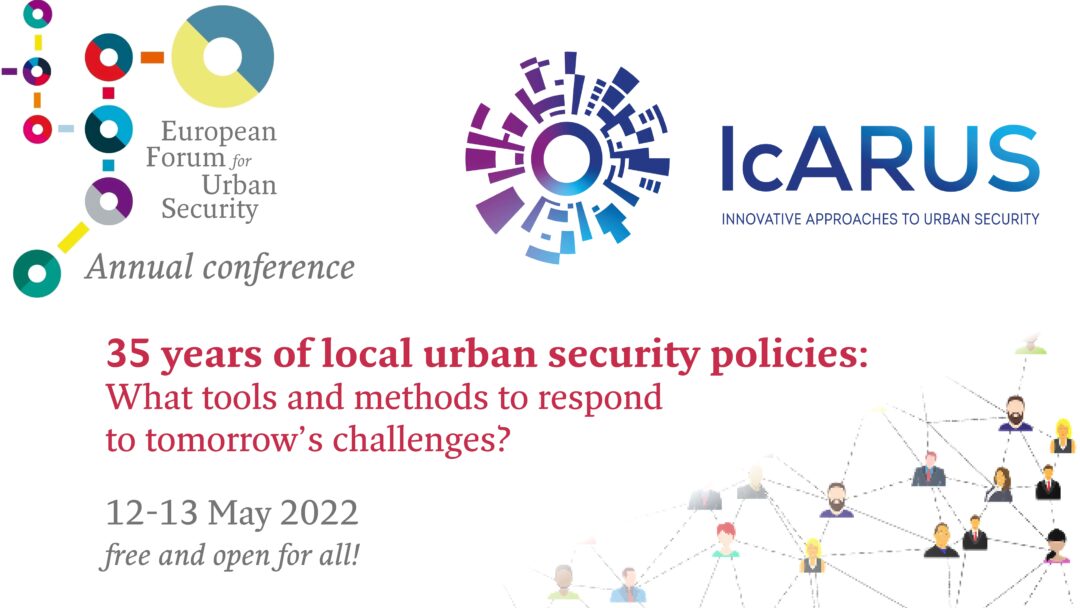Paris, France, September 2020 – The 17 partners of the new IcARUS (Innovative AppRoach to Urban Security) European project, which is designed and led by Efus and seeks to thoroughly reconsider the tools used in urban security through analysing the research and practices conducted in the past three decades, took part in a two-day, online kick off meeting, on 21 and 22 September. With a duration of four years, this project funded by the European Union’s Horizon 2020 research programme is at once innovative, ambitious and particularly important for Efus.
Providing cities with evidence-based methodological tools
IcARUS follows up on the work carried by Efus on urban security tools and methodologies, which it contributed to develop since its foundation (1987) by linking political decision makers, practitioners and the research community. In particular, Efus’ work on local safety audits – which resulted in the publication in 2007 of Local Safety Audits – A Compendium of International Practice – was instrumental in making such an approach the cornerstone of local crime prevention and urban security policies.
This work was furthered and deepened over the years and led in 2017 to the publication of Methods and Tools for a Strategic Approach to Urban Security, a guidebook resulting from the AUDITS European project, which sought to “encourage and help European local policy-makers and practitioners to build and review their security policies using reliable information and data collected on the ground.”
The basis of this long-term effort is the strategic approach to urban security that Efus has long promoted in order to foster integrated local security policies (in other words, holistic), which take into account all the aspects that contribute to a local territory’s security, i.e. crime of course but also social, economic and cultural factors as well as feelings of either security or insecurity experienced by local residents.
Reconsidering tools and methodologies in the face of new challenges
IcARUS tackles three major issues that lead to a re-think of urban security tools and methodologies in the face of new challenges:
· The decrease of citizens’ trust in institutions, local elected officials and other security and prevention actors, which requires strengthening citizens’ and local security stakeholders’ participation in a bottom-up approach (as opposed to top-down decisions);
· Drastic cuts in public spending, which creates the need for co-producing security in association with all relevant actors, as well as pooling resources and developing security policies that bring real value for citizens;· The fact that cities are increasingly interconnected and “smart”, which requires adapting urban security solutions and tools and improving the use of new technologies and social innovations.
Analysing public policies and developing innovative tools
IcARUS will conduct a cross analysis of the evolution of public urban security policies in Europe over the last three decades. This will allow developing innovative tools consistent with the strategic approach to urban security long promoted by Efus.
In a second phase, these tools will be implemented through pilot projects in IcARUS’ partner cities. These will tackle issues that highlight the complexity of urban security, such as the prevention of radicalisation and polarisation, the security of public spaces, youth violence, and the roots and local impacts of organised crime, to name a few.
A unique opportunity for pooling practices and research
This project is in line with Efus’ long term objectives of involving a large array of local security actors in local urban security policies, developing innovative tools, and making them accessible to as many local authorities, elected officials and citizens as possible.
Elizabeth Johnston, Efus’ Executive Director, said that “IcARUS offers a unique opportunity to draw together the best evidence from urban security research and practice over the last 30 years in order to implement an integrated, evidence-based and multi-stakeholder approach to urban security problems.”
IcARUS will thus reinforce the role of local and regional authorities in the design of public security policies according to a balanced approach combining prevention, sanction and social cohesion. It will also contribute to making crime prevention and security policies more agile, targeted and efficient by better harnessing technological and social innovation.
The dissemination of IcARUS’ results will ensure the project’s sustainability, and trainings on its methodology and tools will be organised for other cities in Europe.
The project partners:
Cities of Lisbon (PT), Nice (FR), Riga (LV), Rotterdam (NL), Stuttgart (DE), Turin (IT)
Other partners: Erasmus University of Rotterdam (NL), Eurocircle (FR), Fondation de l’Institut de recherche (IDIAP) (CH), Globaz, S.A (LOBA) (PT), Kentro Meleton Asfaleias (KEMEA) (GR), Lab. U. Crim (GR), Makesense (FR), Plus Ethics (SP), Salzburg University of Applied Sciences (AT), University of Leeds (UK), University of Salford (UK)

This project has received funding from the European Union’s Horizon 2020 research and innovation programme under agreement No 882749




